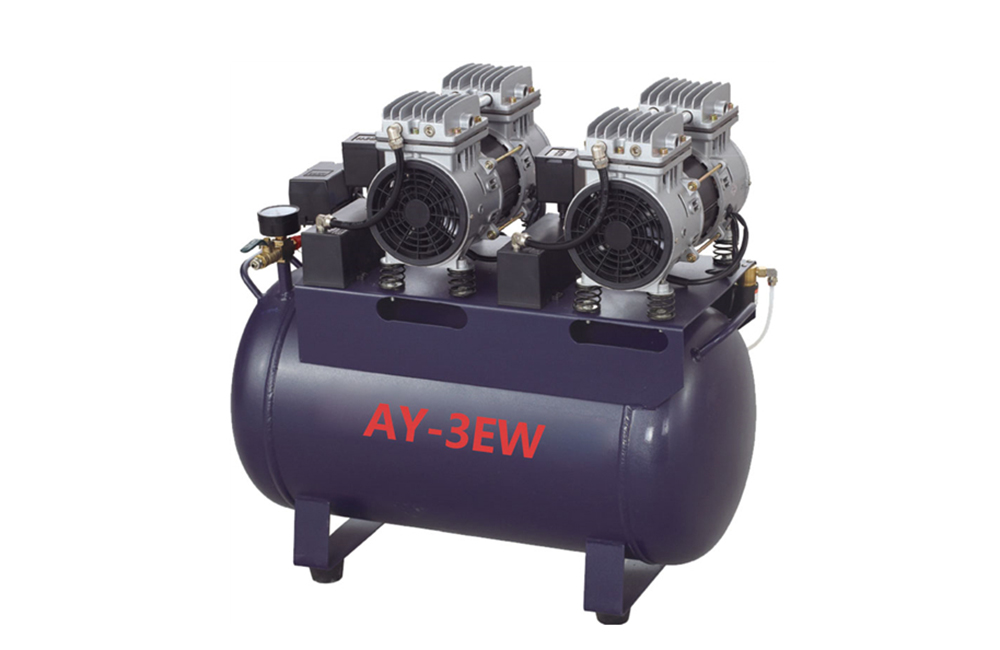What Is The Dental Air Compressor?
A dental air compressor is an indispensable piece of equipment in modern dental practices. It is a mechanical device that compresses air and stores it under pressure, providing a reliable source of compressed air for various dental instruments and procedures. The importance of dental air compressors cannot be overstated, as they play a crucial role in powering many essential dental tools and ensuring the smooth operation of dental practices.
Reciprocating dental air compressors are another popular choice, utilizing a piston-driven mechanism to compress air. These compressors are known for their durability and reliability. Scroll dental air compressors, which use a spiral-shaped scroll mechanism, are also gaining popularity due to their energy efficiency and low noise levels.
Noise levels are also an important consideration, as dental practices strive to maintain a comfortable and quiet environment for both patients and staff. Durability and reliability are essential, as dental air compressors are expected to operate continuously and withstand the demands of a busy dental practice.
Ease of maintenance is another key feature, as regular maintenance is crucial for ensuring the longevity and efficient operation of dental air compressors.
Compressed air from dental air compressors is also utilized for patient drying and cleaning purposes, ensuring a comfortable and hygienic experience during dental treatments.
Space constraints within the dental office should also be considered, as dental air compressors come in various sizes and configurations. Energy efficiency is another important factor, as energy-efficient compressors can significantly reduce operational costs over time.
Maintenance requirements and associated costs should be evaluated, as regular maintenance is essential for ensuring the longevity and optimal performance of dental air compressors. Finally, budget considerations play a role in the decision-making process, as dental air compressors can vary significantly in price depending on their features and capabilities.
Common issues that may arise with dental air compressors include air leaks, overheating, and excessive noise. Troubleshooting these issues promptly is essential to prevent further damage and ensure uninterrupted operation.
Proper installation and ventilation are also critical factors in maintaining the longevity of dental air compressors. Inadequate ventilation can lead to overheating and premature failure, while improper installation can cause vibration and noise issues.
By adhering to recommended maintenance practices and addressing any issues promptly, dental practices can extend the lifespan of their dental air compressors and ensure a consistent and reliable supply of compressed air for their dental instruments and procedures. If you are looking for top-quality dental air compressors, please feel free to contact us!
Types of Dental Air Compressors
Dental air compressors come in various types, each designed to meet specific needs and requirements. One of the most common types is the oil-free dental air compressor, which operates without the use of lubricating oil, ensuring a clean and contaminant-free air supply. Lubricated dental air compressors, on the other hand, use oil for lubrication and are often more suitable for heavy-duty applications.Reciprocating dental air compressors are another popular choice, utilizing a piston-driven mechanism to compress air. These compressors are known for their durability and reliability. Scroll dental air compressors, which use a spiral-shaped scroll mechanism, are also gaining popularity due to their energy efficiency and low noise levels.
Key Features of Dental Air Compressors
When evaluating dental air compressors, several key features must be considered. Air delivery capacity, measured in cubic feet per minute (CFM), determines the compressor's ability to supply sufficient air for multiple dental instruments simultaneously. Operating pressure, measured in pounds per square inch (PSI), is another crucial factor, as different dental tools require specific air pressure ranges for optimal performance.Noise levels are also an important consideration, as dental practices strive to maintain a comfortable and quiet environment for both patients and staff. Durability and reliability are essential, as dental air compressors are expected to operate continuously and withstand the demands of a busy dental practice.
Ease of maintenance is another key feature, as regular maintenance is crucial for ensuring the longevity and efficient operation of dental air compressors.
Applications of Dental Air Compressors
Dental air compressors have a wide range of applications within dental practices. They are primarily used to power dental handpieces and scalers, which are essential tools for various dental procedures, such as drilling, polishing, and scaling. Additionally, dental air compressors are used to operate air-driven dental instruments, such as air abrasion units, which are used for tooth preparation and cleaning.Compressed air from dental air compressors is also utilized for patient drying and cleaning purposes, ensuring a comfortable and hygienic experience during dental treatments.
Factors to Consider When Choosing a Dental Air Compressor
When selecting a dental air compressor, several factors must be taken into consideration. The size of the dental practice and the anticipated air demand are crucial determinants, as larger practices with multiple operatories will require a compressor with a higher air delivery capacity.Space constraints within the dental office should also be considered, as dental air compressors come in various sizes and configurations. Energy efficiency is another important factor, as energy-efficient compressors can significantly reduce operational costs over time.
Maintenance requirements and associated costs should be evaluated, as regular maintenance is essential for ensuring the longevity and optimal performance of dental air compressors. Finally, budget considerations play a role in the decision-making process, as dental air compressors can vary significantly in price depending on their features and capabilities.
Maintenance and Troubleshooting
Proper maintenance is crucial for ensuring the reliable and efficient operation of dental air compressors. Regular maintenance schedules should be established and followed diligently, including tasks such as air filter replacements, oil changes (for lubricated compressors), and inspections for wear and tear.Common issues that may arise with dental air compressors include air leaks, overheating, and excessive noise. Troubleshooting these issues promptly is essential to prevent further damage and ensure uninterrupted operation.
Proper installation and ventilation are also critical factors in maintaining the longevity of dental air compressors. Inadequate ventilation can lead to overheating and premature failure, while improper installation can cause vibration and noise issues.
By adhering to recommended maintenance practices and addressing any issues promptly, dental practices can extend the lifespan of their dental air compressors and ensure a consistent and reliable supply of compressed air for their dental instruments and procedures. If you are looking for top-quality dental air compressors, please feel free to contact us!


